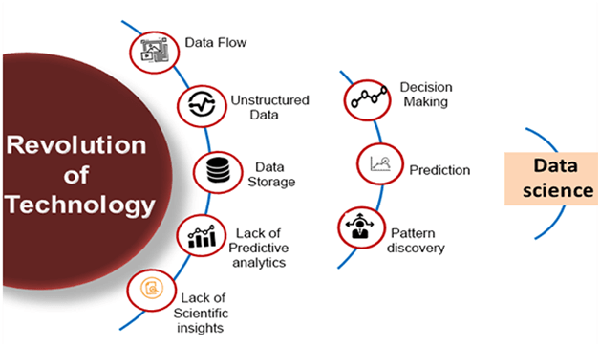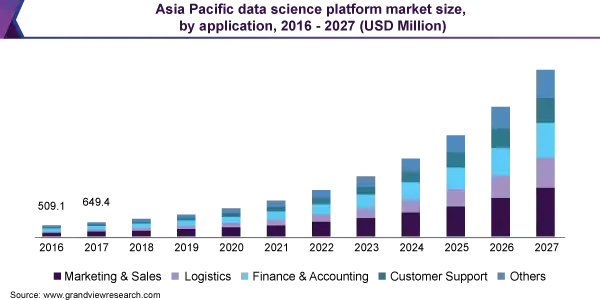KEY TAKEAWAYS
- Data science analyzes user behavior, preferences, and historical data, to provide a more personalized service.
- It identifies pain points, optimizes designs, and therefore, enhances overall user experience.
- Predictive analytics help e-commerce industries stay ahead of future trends and be proactive in detecting any bug infiltration.
- Data-driven techniques improve search engine rankings.
- Regular A/B testing and experimentation keep the data updated and secure. It also allows smooth cross-device compatibility.
In the rapidly evolving landscape of technology, the fusion of data science and web development has paved the way for revolutionary changes. It is the art of extracting valuable insights from vast amounts of data and has found a complementary partner in web development. This synergy is reshaping the digital world by creating more personalized, efficient, and user-centric web experiences.
Taking a Data Science Online Course is relevant because it teaches you different methods to make sense of big amounts of information. You learn to use special tricks on computers to find hidden patterns in data that can help solve problems and make smart decisions. This knowledge is super useful in many jobs and helps you understand the world in a new, cool way.
In this article, we’ll explore the way data science is transforming web development, from enhancing user experience to optimizing performance, and how this fusion is changing the way we interact with the online realm.
Gone are the days of one-size-fits-all web experiences. Data science has brought forth a new era of personalization. Through the analysis of user behavior, preferences, and historical data, developers can now create websites and applications that adapt to each user’s unique needs.
This is evident in the rise of recommendation systems, which power personalized content,
product suggestions, and tailored advertisements. By harnessing data, developers can craft interfaces that anticipate user desires, leading to increased engagement and customer satisfaction.
In the realm of web development, informed decisions drive success. Data science equips developers with the tools to make data-driven choices throughout the development lifecycle.
By analyzing user metrics, traffic patterns, and conversion rates, developers can identify pain points and optimize their designs accordingly. This interactive approach fosters continuous improvement, ensuring that websites evolve in alignment with user expectations.
User experience lies at the heart of web development, and data science has elevated UX to new heights. Heatmaps, click-through rates, and user journey analysis provide invaluable insights into users’ interaction with a website.
Armed with this information, developers can streamline navigation, optimize layouts, and eliminate barriers, resulting in a smoother and more intuitive user experience.

Predictive analytics, a cornerstone of data science, is making waves in web development. By analyzing historical data, developers can forecast future trends and user behaviors. This predictive prowess is especially potent in e-commerce, where developers can anticipate demand spikes and ensure sufficient server capacity. Moreover, predictive models aid in proactive bug detection and prevention, leading to improved website reliability.
Data science plays a pivotal role in optimizing website performance. Through performance analytics, developers can identify sluggish areas and blockages that hinder loading times. This information allows for precise optimization, such as compressing images, minifying code, and utilizing content delivery networks (CDNs) strategically. As a result, websites load faster, leading to reduced bounce rates and increased user engagement.
The marriage of data science and web development has given birth to a new era of SEO. Developers now employ data-driven techniques to boost search engine rankings. Through keyword analysis, content optimization, and backlink assessment, websites can climb search engine result pages (SERPs) more effectively. This synergy ensures that websites are not only well-designed but also highly discoverable.
Getting to know people who use websites right away is like having a super valuable treasure. Imagine you have special tools that help you see what people are doing on a website as they’re doing it. This helps the people who build the website make quick changes while it’s still up and running.
Think of it like having a remote control for a video game that you can use while you’re playing. With these special tools, the website builders can fix problems immediately, try out new things, and see people’s reaction to them. It’s like getting instant feedback on a live game and making it even more fun as you play. This quick back-and-forth helps the website get better and better over time.

Staying safe online is necessary these days, and data science plays a big role in making websites more secure. Imagine a digital bodyguard that watches out for bad guys trying to break into websites. It is like a bodyguard, powered by fancy computer tricks, checks the reasons for cyberattacks and figures out ways to make websites stronger against those attacks.
The computer tricks involve using smart algorithms that can spot strange and unusual behavior. When they see something fishy, like someone trying to sneak into a website, they sound an alarm to let the website’s caretakers know.
These smart algorithms also learn from new types of bad-guy tricks that show up, so they’re always getting better at stopping the bad guys. This smart way of working keeps user information safe and makes sure websites work as they should.
In the world of making websites, a cool technique called data-driven A/B testing is significant. Imagine you have two versions of a webpage – let’s call them A and B. By showing these versions to different people and checking which one they like more, developers can figure out what works best.
It’s like trying out different flavors of ice cream to see which one people enjoy more. This process happens over and over again, and each time, the developers learn something new from the results. They use this learning to make small, step-by-step improvements to the webpage. It’s kind of like building a puzzle where each piece makes the picture even better.
All these little improvements add up, and in the end, the webpage becomes really awesome and user-friendly. So, this clever way of testing and changing helps make websites look and work even better!
Responsive design, a staple of modern web development, owes its success to data science. By analyzing user devices and screen sizes, developers can ensure that websites adapt seamlessly to various platforms. This cross-device compatibility enhances user experience and ensures consistent functionality across smartphones, tablets, and desktops.
Watch Data Science Training videos and gain more insights.
The amalgamation of data science and web development has given rise to a new digital paradigm. From personalized experiences to performance optimization, the transformative power of data is reshaping the web development landscape.
As developers harness the insights extracted from data, websites, and applications are becoming more user-centric, efficient, and secure. The evolution of web development through data science underscores the importance of adaptability and innovation in the ever-evolving digital era.
Embracing this synergy can unlock boundless possibilities, making the web a more accessible, enjoyable, and productive space for users worldwide.
